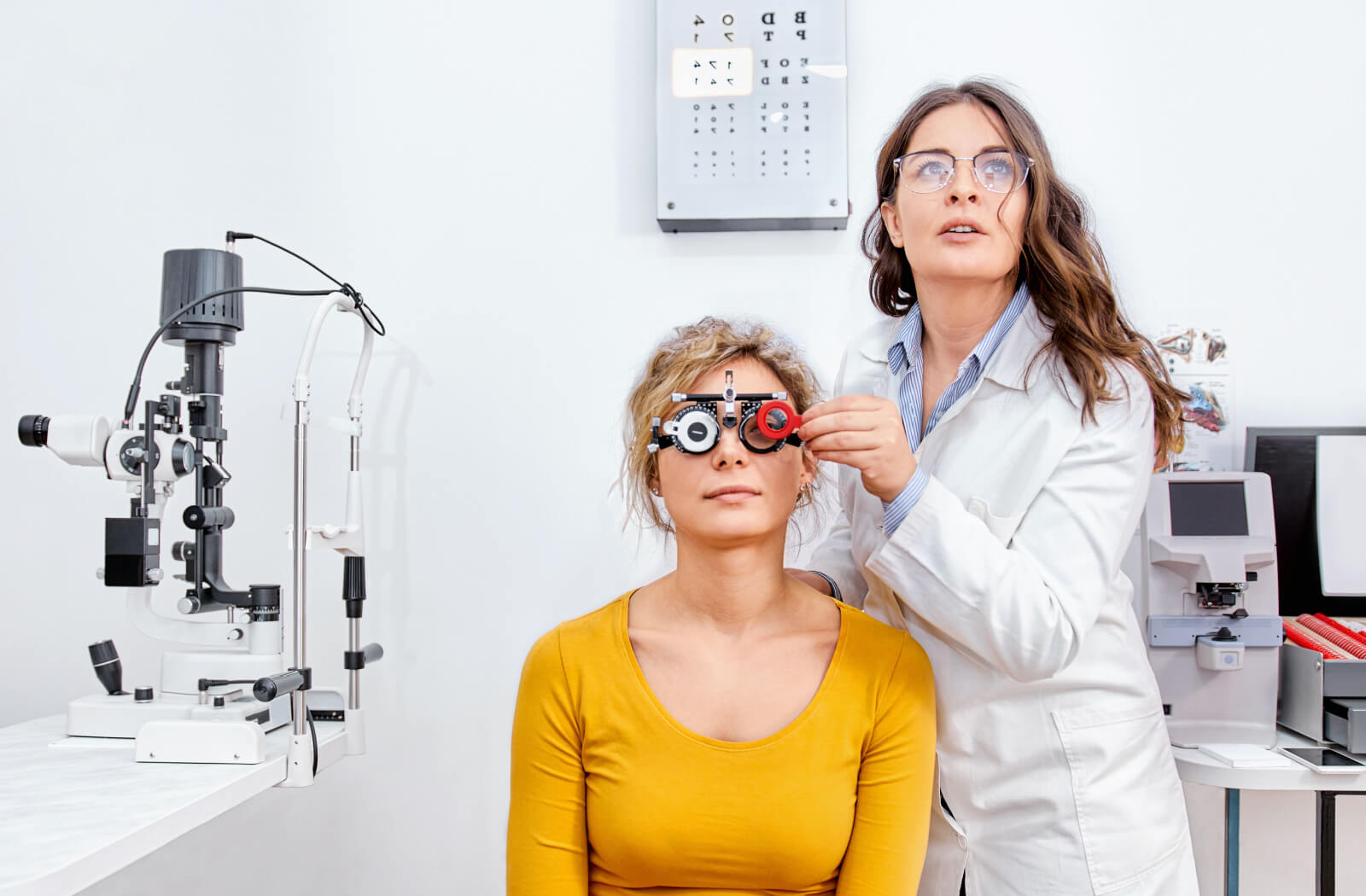How Often Should You Get an Eye Exam?
 Did you know that many vision problems can develop silently and without any noticeable symptoms? This makes regular eye exams crucial not only for ensuring you have the best possible vision but also for safeguarding your overall eye health. While most people associate eye exams with getting a prescription for glasses or contact lenses from an optometrist, they play a much more vital role. Regular checkups allow optometrists to detect and treat serious eye conditions like glaucoma, macular degeneration, and cataracts early on, significantly improving the chances of successful treatment and preserving your sight. In this post, we’ll explore the recommended frequency of eye exams based on age, health conditions, and lifestyle factors, and discuss what to expect during a typical eye exam with your optometrist.
Did you know that many vision problems can develop silently and without any noticeable symptoms? This makes regular eye exams crucial not only for ensuring you have the best possible vision but also for safeguarding your overall eye health. While most people associate eye exams with getting a prescription for glasses or contact lenses from an optometrist, they play a much more vital role. Regular checkups allow optometrists to detect and treat serious eye conditions like glaucoma, macular degeneration, and cataracts early on, significantly improving the chances of successful treatment and preserving your sight. In this post, we’ll explore the recommended frequency of eye exams based on age, health conditions, and lifestyle factors, and discuss what to expect during a typical eye exam with your optometrist.
Factors Influencing Exam Frequency
A. Age:
Newborns and Infants:
- Eye exams are crucial in the early stages of life to detect any developmental issues.
- Regular checkups are recommended during the first year to monitor for conditions like amblyopia (“lazy eye”) and strabismus (crossed eyes).
Children:
- Regular eye exams are essential for children to ensure their vision is developing properly and to identify any potential learning difficulties related to vision problems.
- Screenings every 1-2 years are generally recommended.
Adults:
The risk of developing age-related eye diseases increases significantly after the age of 40.
Regular checkups become more important to monitor for conditions such as:
- Presbyopia: Age-related difficulty focusing on near objects.
- Glaucoma: Increased eye pressure that can damage the optic nerve.
- Macular degeneration: Damage to the central part of the retina.
Seniors:
- The risk of age-related eye diseases continues to increase with age.
- Annual eye exams are strongly recommended to monitor for and manage potential vision problems.
B. Health Conditions:
Diabetes:
- People with diabetes are at increased risk of diabetic retinopathy, a condition that damages the blood vessels in the retina.
- Regular eye exams are crucial to monitor for this condition and prevent vision loss.
High Blood Pressure:
- High blood pressure can damage the blood vessels in the eyes, increasing the risk of eye conditions like hypertensive retinopathy and stroke.
- Regular eye exams are recommended to monitor for these conditions.
Autoimmune Diseases:
- Certain autoimmune diseases, such as lupus and rheumatoid arthritis, can increase the risk of developing eye conditions like uveitis (inflammation of the middle layer of the eye).
- Regular eye exams are important to monitor for and manage these conditions.
C. Lifestyle Factors:
Prolonged Screen Time:
Spending extended periods in front of computers, smartphones, and tablets can strain the eyes and increase the risk of:
- Digital eye strain: Symptoms include eye fatigue, headaches, blurred vision, and dry eyes.
- Myopia (nearsightedness): Some studies suggest a potential link between excessive screen time and the development of nearsightedness in children.
Certain Occupations:
Individuals working in certain professions may be at increased risk for eye problems due to occupational hazards:
- Industrial workers: Exposure to chemicals, dust, and fumes.
- Construction workers: Risk of eye injuries from debris and flying objects.
- Welders and other workers exposed to bright lights: Increased risk of eye damage from ultraviolet radiation.
Medications:
Some medications can have side effects that affect vision:
- Steroid medications: Can increase the risk of glaucoma.
- Certain antihistamines: Can cause dry eye.
This section highlights how age, certain health conditions and lifestyle factors can significantly impact your eye health and the frequency of recommended eye exams. If you have any concerns about how your lifestyle might affect your vision, consult with your optometrist for personalized advice.
Recommended Exam Schedules
Children:
Newborns:
- A comprehensive eye exam is crucial shortly after birth to detect any congenital eye conditions.
Infants:
- Regular checkups are recommended during the first year of life to monitor for developmental issues and address any concerns.
Preschoolers:
- An eye exam before starting school is important to identify any vision problems that could affect a child’s learning.
School-aged Children:
- Regular eye exams every 1-2 years are generally recommended to ensure their vision is developing properly and to address any potential vision-related learning difficulties.
Adults:
Ages 20-40:
- If you have no significant risk factors for eye disease, an eye exam every 2-4 years is usually sufficient.
Ages 40-65:
- The risk of age-related eye diseases increases, so more frequent eye exams are recommended.
- A comprehensive eye exam every 1-3 years is generally advised.
- More frequent exams may be necessary if you have any risk factors for eye disease.
Ages 65 and Older:
- Annual eye exams are strongly recommended due to the significantly increased risk of age-related eye diseases such as glaucoma, cataracts, and macular degeneration.
This section provides general guidelines for recommended eye exam schedules based on age. Remember that these are just general recommendations, and individual needs may vary.
What to Expect During an Eye Exam
A comprehensive eye exam typically includes the following:
Visual Acuity Tests:
- Standard Eye Chart: This classic test measures your ability to read letters or symbols from a distance.
- Near Vision Tests: Assesses your ability to read fine print at close range, which is important for activities like reading and using electronic devices.
Eye Pressure Measurement:
- Tonometry: This test measures the pressure inside your eye. Elevated eye pressure is a risk factor for glaucoma.
Ophthalmoscopy:
- Dilated Eye Exam: Your optometrist may dilate your pupils with eye drops to get a better view of the internal structures of your eye, including the retina, optic nerve, and macula.
Refraction:
- A series of tests to determine the best lens prescription for correcting your vision, if needed. This may involve using different lenses to find the clearest vision.
During your exam, your optometrist will also ask you about your medical history, any current eye problems you may be experiencing, and your family history of eye diseases. Be sure to be open and honest with your optometrist about any concerns you may have.
Finding the Right Eye Doctor
Choosing the right eye doctor is an important decision. Consider these factors:
Specialization:
- Optometrists are primary eye care providers who can diagnose and treat most eye conditions.
- Ophthalmologists are medical doctors who specialize in eye care and surgery.
Patient Reviews:
- Read online reviews from other patients to get an idea of their experiences with different eye doctors.
Referrals:
- Ask your primary care physician, friends, or family members for recommendations.
Consultation:
- Schedule a consultation with a few different eye doctors to get a feel for their practice and see if you feel comfortable with them.
By taking the time to find an eye doctor you trust, you can ensure that you receive the best possible care for your vision.
Regular eye exams are essential for maintaining good eye health and preventing vision loss. By scheduling and attending regular checkups, you can:
- Detect and treat eye diseases early: Early detection and treatment of conditions like glaucoma and macular degeneration significantly improve the chances of successful treatment and vision preservation.
- Ensure you have the best possible vision: Regular eye exams help ensure you have the clearest vision possible through the proper prescription for glasses or contact lenses.
- Maintain overall eye health: Regular checkups allow your optometrist to monitor your eye health and address any concerns you may have.
Don’t wait for vision problems to arise. Schedule your next eye exam today and take proactive steps to protect your vision for years to come.
Please Note: The above information is for general knowledge and informational purposes only and does not constitute medical advice. Always consult with a qualified optometrist or ophthalmologist for personalized recommendations regarding your eye health.




